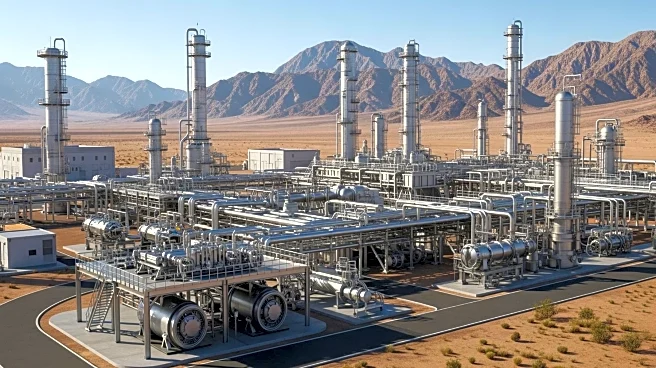What's Happening?
Tanzania is on the verge of launching a significant industrial project with the development of a gas-to-liquid (GTL) plant. This $420 million investment aims to produce diesel, jet fuel, naphtha, hydrogen, and fertilizer, positioning Tanzania as Africa's
first exporter of synthetic jet fuel and diesel. The project, led by Rocky Mountain GTL, a Canadian clean-fuel technology company, has completed a feasibility study confirming its economic and technical viability. The initiative is set to capitalize on Tanzania's vast natural gas reserves, estimated at 57.54 trillion cubic feet. Meetings between Rocky Mountain GTL representatives and Tanzanian government officials have paved the way for detailed commercial collaboration, with plans to supply Tanzania with diesel and jet fuel, and potentially export hydrogen to Europe and Asia.
Why It's Important?
This development is poised to reshape the jet-fuel trade in Africa, challenging the current dominance of Dangote's refinery and distribution network. The Dangote Refinery in Nigeria, known for its large-scale operations, has been a major supplier of aviation kerosene across Africa. Tanzania's entry into the market could reduce dependence on refined imports, offering East Africa an alternative hub for supply and pricing. The GTL plant's success could lead to regional exports, providing airlines in neighboring countries like Kenya, Uganda, and Rwanda with a closer and potentially cheaper fuel source. This project is critical to Tanzania's industrialization agenda, aiming to cut costs for local airlines and enhance competitiveness.
What's Next?
The Tanzanian government has initiated a high-level due-diligence process to validate the technology and assess readiness for rollout. The modular design of the GTL plant allows for faster commissioning, potentially within two years, compared to the five to seven years required for conventional refineries. Local financiers are advocating for priority participation to ensure that Tanzanian businesses retain the majority of economic benefits. If successful, the project could significantly reduce Tanzania's import spending on petroleum products, which amounted to $2.6 billion last year.
Beyond the Headlines
The project not only promises economic benefits but also highlights the strategic importance of energy independence for Tanzania. By developing local production capabilities, Tanzania can enhance its energy security and reduce vulnerability to global market fluctuations. The potential hydrogen exports to Europe and Asia could open new high-value markets, further integrating Tanzania into the global energy landscape. This initiative underscores the growing importance of clean-fuel technology in addressing both economic and environmental challenges.


















